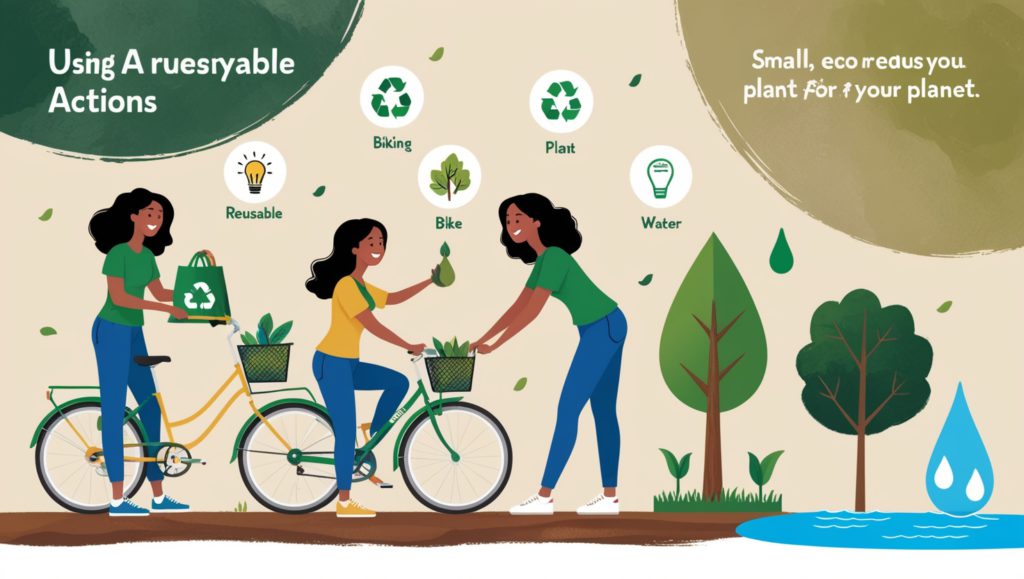Reduce your Carbon Footprint
Reduce Your Carbon Footprint an ever-pressing issue, each of us has a role to play in reducing our carbon footprint. The concept of a carbon footprint reflects the total greenhouse gas emissions caused by our actions—whether it’s commuting to work, shopping, or even cooking a meal. While global action and policy change are essential for long-term climate solutions, small lifestyle changes can also make a significant impact on reducing emissions.
Here are some practical, everyday steps you can take to lower your carbon footprint and contribute to a healthier planet.
1. Choose Energy-Efficient Appliances
Energy-efficient appliances help reduce the amount of electricity used, ultimately lowering emissions. Look for the Energy Star label when shopping for home appliances, which signifies that they meet energy-saving standards. Even smaller changes, like switching to LED light bulbs, can make a difference.
Quick Tip: Remember to unplug devices when not in use, as many continue to draw power even when turned off.
2. Reduce, Reuse, Recycle
One of the simplest ways to cut down on carbon emissions is by reducing waste. Try to buy only what you need, and opt for products with minimal packaging. Reuse items whenever possible, and recycle responsibly. Adopting a zero-waste mindset can reduce demand for resources, thus lowering carbon emissions.
Quick Tip: Start with small changes like bringing a reusable bag for shopping or switching to a reusable water bottle.
3. Opt for Sustainable Transportation
Transportation is a major contributor to greenhouse gas emissions. By walking, biking, carpooling, or using public transport, you can significantly reduce your footprint. If driving is necessary, consider electric or hybrid vehicles as alternatives to traditional gas-powered cars.
Quick Tip: Try consolidating errands into one trip to save fuel, or explore telecommuting options to reduce daily travel.
4. Shop Local and Support Sustainable Brands
Buying locally sourced food and products reduces the emissions associated with long-distance transportation. Additionally, supporting brands that prioritize sustainable practices encourages more companies to adopt eco-friendly methods.
Quick Tip: Farmers’ markets are a great place to find fresh, locally grown produce that supports local farmers and reduces emissions.
5. Adopt a Plant-Based Diet
Research shows that reducing meat and dairy consumption can significantly reduce an individual’s carbon footprint. Livestock farming is one of the largest contributors to greenhouse gas emissions, so even small steps, like introducing Meatless Mondays or choosing plant-based options, can have a meaningful impact.
Quick Tip: Start by adding one plant-based meal per day to your diet to get comfortable with the change.
6. Conserve Water
Water treatment requires a lot of energy, so conserving water also conserves energy. Simple steps like taking shorter showers, fixing leaky faucets, and using water-efficient fixtures can save both water and energy.
Quick Tip: Try collecting rainwater to water plants or invest in water-saving showerheads.
7. Be Mindful of Digital Consumption
Surprisingly, our digital habits—like streaming, cloud storage, and emails—have a carbon footprint due to the energy used by data centers. Reducing unnecessary storage, minimizing streaming time, and even deleting unused files can help.
Quick Tip: Download videos or music instead of streaming them repeatedly to reduce energy use.
Why Small Changes Matter
Each of these actions may seem small, but collectively, they can make a big difference. Individual contributions add up, especially as more people join in making sustainable choices. Additionally, personal lifestyle changes often inspire larger movements, encouraging companies and policymakers to prioritize environmentally friendly practices.
Conclusion
By taking intentional steps to reduce your carbon footprint, you’re not only helping the environment but also inspiring others to make a difference. Remember, sustainability isn’t about being perfect; it’s about progress. Every small change counts, and together, we can make a big impact for a healthier, greener planet.

